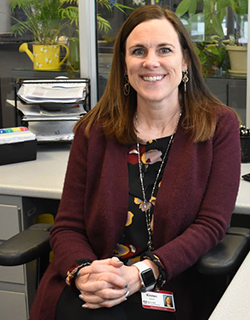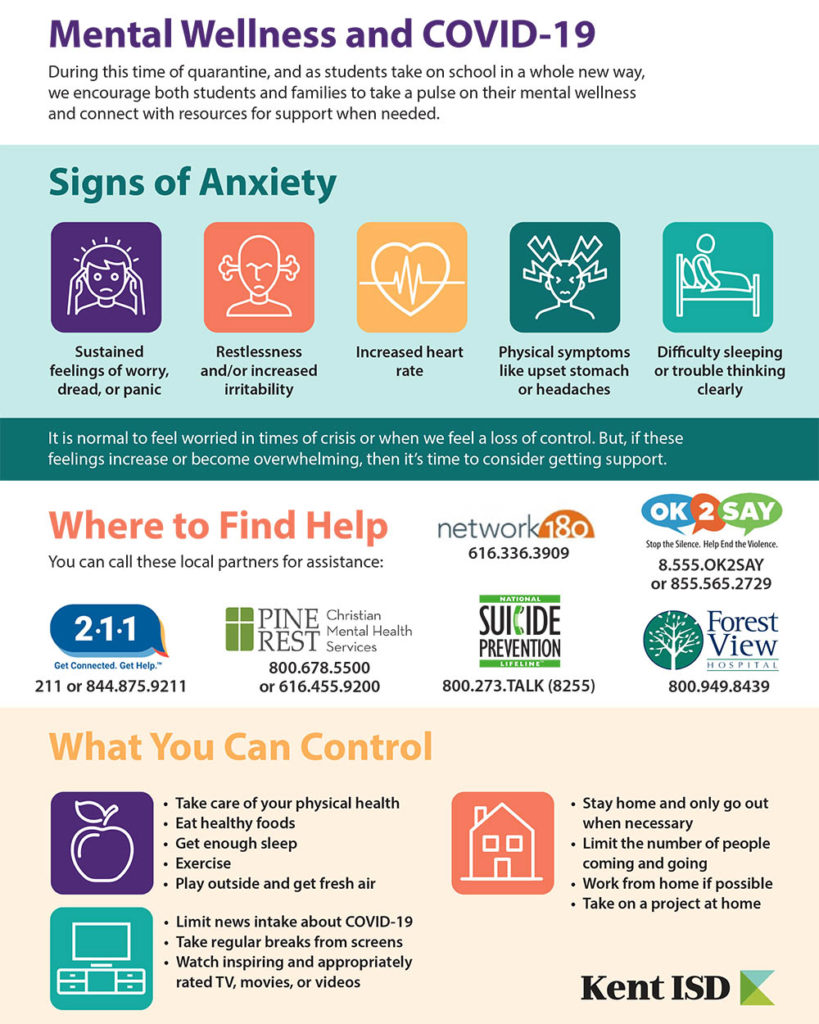Editor’s note: The first in a two-part series on how schools and mental-health professionals are helping students and families struggling through the coronavirus shutdown.
When he got a call late one night from parents worried their son was feeling suicidal, David Jangda knew this needed more than a phone call to the student.
Jangda, a mental health liaison for Rockford Public Schools, drove to the student’s home the next morning. Sitting in the family’s yard, wearing a mask at a safe distance in biting cold, he met first with the student, then the parents, then both together. Later that day they took the student to a hospital, where he was evaluated and admitted for treatment.
For Jangda, braving the cold in his winter coat for 2 ½ hours was necessary to be able to see the student’s body language, form an emotional connection and possibly prevent him from harming himself.
“I’m going to do what I have to do to save children’s lives,” said Jangda, a clinical psychologist formerly with Pine Rest Christian Mental Health Services.
Although most of his counseling work is done over a secure phone line, Jangda has made personal visits to students since schools were closed. Like other counselors and social workers in Kent County schools, he continues to provide services to students struggling with social isolation, anxiety and depression – all of which may be exacerbated by the shutdown.
“They’re watching social media. They’re feeling some panic from things they’re seeing and reading,” Jangda said. “It’s creating a lot of anxiety for kids.”

‘Not a Normal Situation’
Now that they can’t meet with students behind a closed door in their office, school mental health workers are finding other ways to address their problems. Though trying to get students to connect and open up at a distance can create its own problems, it’s vital that they – and their parents – get help navigating this unprecedented time, Jangda and other counselors say.
School districts, as part of their Continuity of Learning Plans, were required to include continued mental health support services. Many of their websites provide robust links to community resources, practical tips for families on coping with forced sheltering, and advice for cultivating good mental and physical health.
Kent ISD created a list of helpful tips to support student mental health, along with how to seek help. It details typical behaviors and emotions, coping skills, schedules, mental rest, processing feelings, focusing on kindness, limiting news consumption and being a role model.
‘This all comes with the additional layer of the fear of getting sick, and will it happen to me or a loved one?’
— Kirsten Myers, Kent ISD director of special education
Meanwhile, counselors and social workers are working with students over virtual platforms, by phone and by finding creative ways to connect. Staff at Grandville elementary schools, for instance, produced an upbeat video to encourage their students.
“The districts have done an exceptional job in reaching out (to families) to determine how to move forward with distance learning and supports for mental health,” said Kirsten Myers, Kent ISD director of special education.
Due to her background in wellness services for students and families, Myers is in charge of reviewing how Kent County’s 20 public school districts are addressing these supports during the school closure. She formerly was director of special services for Rockford, where she oversaw the Developing Healthy Kids program promoting awareness of mental health, substance abuse and suicide prevention.
“There are certainly students and families in significant need due to the nature of this being a pandemic,” Myers said. “This is not a normal situation.”
Kent ISD Providing Support
Kent ISD is utilizing four clinicians, hired through contracts with D.A. Blodgett, Arbor Circle and Family Outreach, to provide an extra layer of service. The clinicians are funded through a state grant to place licensed behavioral health providers in schools. These four work in Thornapple Kellogg, Comstock Park, Kent City, Kenowa Hills, Wyoming, Northview, Kelloggsville and Kentwood.
During the school closure, these clinicians are also supporting an additional 30-plus students and their families Myers said. They and district-employed mental health professionals are reaching out in various ways to struggling students and families.
‘They’re feeling some panic from things they’re seeing and reading. It’s creating a lot of anxiety for kids.’
— David Jangda, Rockford mental health liaison
Altered routines, financial pressures and food insecurity are taxing and can take a toll on people, she said. And social isolation can also negatively impact mental wellness.
“This all comes with the additional layer of the fear of getting sick, and will it happen to me or a loved one? It just can make people feel like things are spinning out of control,” explained Myers.
Helping students control the spinning inspires creative methods. At Wyoming Junior High School, staff members created an office – a virtual one – where students can “stop in” for support.
Michelle Potter, school social worker is operating the office through a Google Classroom page, along with the school’s mental health team. Students can ask questions, share concerns, say hello or even explore careers or do yoga workouts. Potter said they are working to be as available as possible and provide an easy way for students to connect. They also use the “office” to assist some of the parents to get help with needs like food and housing insecurity.
“The social workers and administrators are working with students and families, on an individual basis as we become aware of these needs, to connect them with community resources,” Potter said.

Parents Need Help, Too
In Rockford, David Jangda has stayed away from virtual apps like Zoom, concerned about possible breaches in confidential conversations and about the imperative for students to feel safe to talk. Some students don’t feel comfortable with online sessions, especially with others in the house, and some don’t have internet access, he says.
“A lot of kids just feel if I’m not face to face with someone, it’s not effective (for) what they need to feel more secure about opening up.”
Hired full-time by Rockford last fall, and a former liaison with Forest Hills Public Schools, Jangda reached out to families with a letter in late March encouraging them to seek help for their children if needed. He provided contact information for community mental health agencies and for himself.
He also listed signs of concern in their children to watch out for, including: abrupt changes in mood or habits; debilitating levels of stress or worry; difficulty eating and sleeping; and expressing any intent to harm themselves or others. He heard back from many parents “concerned about the well-being of their children.”
“Our biggest concern is kids being in crisis and (families) not knowing what to do,” Jangda said.
For students who may have been struggling to begin with, the close closures and stay-at-home order have only made things harder, he said. “The biggest thing is isolation,” he said. “These kids are isolated from their friends and routine.”
He’s also seeing struggles from parents suddenly thrust into roles as teachers and counselors while trying to do their own jobs from home. He advises them to get plenty of exercise and strike a lifestyle balance as role models for their kids.
“Parents are trying to do a lot of things at once, so they’re feeling overwhelmed. They’re juggling so much. That’s why I stress to parents, take care of yourself. A healthy parent produces healthy children.”
Jangda said he’s thankful for a supportive school system working to help children and parents stay healthy through a frightening period of history.
“We’re there not just for academics,” he said, “but for their whole well-being.”










